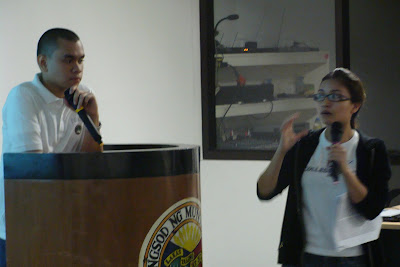By Tracy Ong
The seminar exceeded my expectations and the women, gloriously, made it so. They were so earnest in their participation that it did not feel like a one-way seminar, but a dialogue of the women with the law and the realities that confronted them in everyday life.
The most enlightening part of the seminar for me was the FGDs. It was an enriching experience just to be able to listen to what all these women had to say. If only we had more forums where kernels of everyday wisdom could be shared with everybody.

During the FGDs, I developed a great respect for the women. Our topic was VAWC, and some had very relevant experiences, and yet, there was no indiscriminate bashing of men. Instead, the women engaged in true women’s empowerment. They talked about their rights, as women first, then mothers, wives, sisters, and citizens of our country. Some groups had women ranging from ages 19 and up, and the older women would advise the younger ones about their rights, duties and responsibilities as women to society, to men, and more importantly, to women as well.
One woman shared how sociological perceptions of the alleged superiority of men influence children’s behavior and thinking at home. She shared that her children, after seeing their father dismiss her cooking on the table, dismissed the food she cooked for the family as well. While acknowledging this reality, she recognized that this should not be so, as women are equal to men in all respects.
Another woman shared that she was a widow and a single mother, yet she had no complaints. In fact, she had never felt more liberated in her life. After her husband’s death, she moved out of her husband’s parents’ home and made a life for herself and her child. Upon leaving, she left behind rumors that came with being a widow, and started independently anew, breaking social construct which brands single mothers as freeloaders in society.

Still another woman shared that she had filed a case for unjust vexation against a man who had impregnated her daughter. Because of the pending case against the man, the man could not secure a police clearance, which made it impossible for him to find work. Still, she said, she stood firm in proceeding with the case. It was her child who was violated after all, and her child had the right to be defended by law.
There were many more stories shared that day and all slowly built up to debunk what another woman said earlier that day: “wala akong magawa.” It cannot be denied, of course, that there are women literally trapped in cycles of violence everyday. It haunts them, their children, their families. This, however, should not create a picture of a helpless woman, always in need of saving, saying “kawawa tayo.” Instead, such should just prompt women and society to recognize that there exists an ill in society in the form of discrimination against women, that for every act of violence against a woman, a human being has been wronged, and that she must be vindicated for her right to live in dignity. Women are smarter than what society makes them up to be, stronger than what men would like them to be. The answer to VAWC lies clearly within the women themselves.












